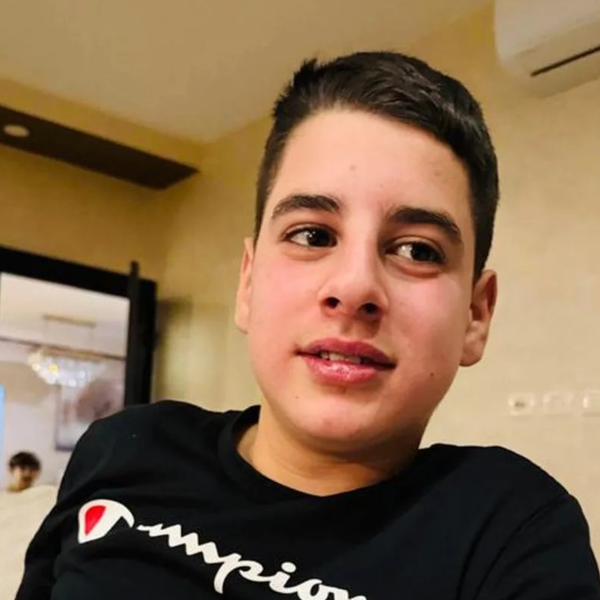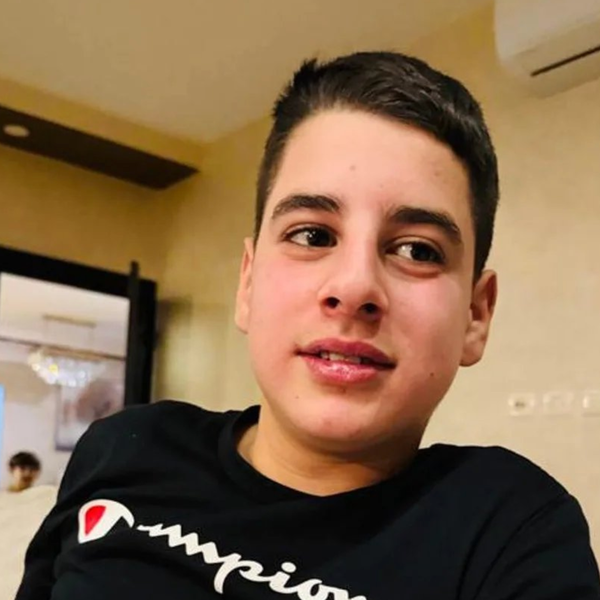Mother of Saudi Teen Sentenced to Crucifixion Urges Obama: 'Rescue My Son'
Ali Mohammed al-Nimr was sentenced to death at the age of 17 after taking part in a rally for equal Shia rights in Saudi Arabia
The mother of teenage pro-democracy protester Ali Mohammed al-Nimr, sentenced to crucifixion by Saudi Arabia, pleaded with President Barack Obama to use his power to pressure the close U.S. ally to spare her son.
In her first interview with foreign media outlets, Nusra al-Ahmed told the Guardian that Obama "can interfere and rescue my son."
"To rescue someone from harm, there is nothing greater than that," she continued. "My son and I are simple people and we don't carry any significance in this world but despite that, if he [Obama] carried out this act, I feel it would raise his esteem in the eyes of the world. He would be rescuing us from a great tragedy."
Al-Nimr was arrested in 2012 when he was just 17 years old following his attendance of a rally for Shia rights in the eastern city of Qatif, according to his mother. After being denied access to a lawyer, al-Nimr was sentenced to death by beheading and crucifixion in May 2014 on charges that include taking part in demonstrations against the government and possessing a gun--the latter of which his family strongly denies. "The court seems to have based its decision solely on 'confessions' which Ali al-Nimr has said were extracted under torture and other ill-treatment," noted Amnesty International.
Al-Ahmed confirmed to the Guardian that her son had been tortured and brutalized. "When I visited my son for the first time I didn't recognize him," she said. "I didn't know whether this really was my son Ali or not. I could clearly see a wound on his forehead. Another wound in his nose. They disfigured it. Even his body, he was too thin."
Al-Nimr is not alone. Dawoud al-Marhoon was also sentenced to die at the age of 17 under similar circumstances, and both executions are imminent. Between August 2014 and June 2015, at least 175 people were executed by the Saudi state after unfair trials, in a country where adultery is punishable by death and neither children nor the mentally handicapped are spared from execution.
Al-Nimr's case has shined a global spotlight on Saudi human rights abuses--within its own borders and around the world, including in Yemen where the state stands accused of numerous war crimes in its ongoing military onslaught. The pending execution has also called attention to the complicity of global superpowers that maintain close relations--and sell weapons to--the Gulf state, particularly the U.S. and UK.
Maya Foa, head of the death penalty team at human rights organization Reprieve, charged Wednesday that "the response of the U.S.--the Saudis' closest ally--to these outrages has been woefully inadequate."
"The beheading of these two boys, who were arrested and tortured for merely attending protests, would be a grotesque miscarriage of justice," Foa continued. "President Obama must listen to the call from Ali's desperate family, and step in now to urge the Saudis to change course."
When questioned by a reporter last month, U.S. State Department spokesperson Mark Toner expressed "concerns" but declined to condemn al-Nimr's sentence. He went on to "welcome" Saudi Arabia's recent appointment to head a U.N. Human Rights Council panel.
An Urgent Message From Our Co-Founder
Dear Common Dreams reader, The U.S. is on a fast track to authoritarianism like nothing I've ever seen. Meanwhile, corporate news outlets are utterly capitulating to Trump, twisting their coverage to avoid drawing his ire while lining up to stuff cash in his pockets. That's why I believe that Common Dreams is doing the best and most consequential reporting that we've ever done. Our small but mighty team is a progressive reporting powerhouse, covering the news every day that the corporate media never will. Our mission has always been simple: To inform. To inspire. And to ignite change for the common good. Now here's the key piece that I want all our readers to understand: None of this would be possible without your financial support. That's not just some fundraising cliche. It's the absolute and literal truth. We don't accept corporate advertising and never will. We don't have a paywall because we don't think people should be blocked from critical news based on their ability to pay. Everything we do is funded by the donations of readers like you. Will you donate now to help power the nonprofit, independent reporting of Common Dreams? Thank you for being a vital member of our community. Together, we can keep independent journalism alive when it’s needed most. - Craig Brown, Co-founder |
The mother of teenage pro-democracy protester Ali Mohammed al-Nimr, sentenced to crucifixion by Saudi Arabia, pleaded with President Barack Obama to use his power to pressure the close U.S. ally to spare her son.
In her first interview with foreign media outlets, Nusra al-Ahmed told the Guardian that Obama "can interfere and rescue my son."
"To rescue someone from harm, there is nothing greater than that," she continued. "My son and I are simple people and we don't carry any significance in this world but despite that, if he [Obama] carried out this act, I feel it would raise his esteem in the eyes of the world. He would be rescuing us from a great tragedy."
Al-Nimr was arrested in 2012 when he was just 17 years old following his attendance of a rally for Shia rights in the eastern city of Qatif, according to his mother. After being denied access to a lawyer, al-Nimr was sentenced to death by beheading and crucifixion in May 2014 on charges that include taking part in demonstrations against the government and possessing a gun--the latter of which his family strongly denies. "The court seems to have based its decision solely on 'confessions' which Ali al-Nimr has said were extracted under torture and other ill-treatment," noted Amnesty International.
Al-Ahmed confirmed to the Guardian that her son had been tortured and brutalized. "When I visited my son for the first time I didn't recognize him," she said. "I didn't know whether this really was my son Ali or not. I could clearly see a wound on his forehead. Another wound in his nose. They disfigured it. Even his body, he was too thin."
Al-Nimr is not alone. Dawoud al-Marhoon was also sentenced to die at the age of 17 under similar circumstances, and both executions are imminent. Between August 2014 and June 2015, at least 175 people were executed by the Saudi state after unfair trials, in a country where adultery is punishable by death and neither children nor the mentally handicapped are spared from execution.
Al-Nimr's case has shined a global spotlight on Saudi human rights abuses--within its own borders and around the world, including in Yemen where the state stands accused of numerous war crimes in its ongoing military onslaught. The pending execution has also called attention to the complicity of global superpowers that maintain close relations--and sell weapons to--the Gulf state, particularly the U.S. and UK.
Maya Foa, head of the death penalty team at human rights organization Reprieve, charged Wednesday that "the response of the U.S.--the Saudis' closest ally--to these outrages has been woefully inadequate."
"The beheading of these two boys, who were arrested and tortured for merely attending protests, would be a grotesque miscarriage of justice," Foa continued. "President Obama must listen to the call from Ali's desperate family, and step in now to urge the Saudis to change course."
When questioned by a reporter last month, U.S. State Department spokesperson Mark Toner expressed "concerns" but declined to condemn al-Nimr's sentence. He went on to "welcome" Saudi Arabia's recent appointment to head a U.N. Human Rights Council panel.
The mother of teenage pro-democracy protester Ali Mohammed al-Nimr, sentenced to crucifixion by Saudi Arabia, pleaded with President Barack Obama to use his power to pressure the close U.S. ally to spare her son.
In her first interview with foreign media outlets, Nusra al-Ahmed told the Guardian that Obama "can interfere and rescue my son."
"To rescue someone from harm, there is nothing greater than that," she continued. "My son and I are simple people and we don't carry any significance in this world but despite that, if he [Obama] carried out this act, I feel it would raise his esteem in the eyes of the world. He would be rescuing us from a great tragedy."
Al-Nimr was arrested in 2012 when he was just 17 years old following his attendance of a rally for Shia rights in the eastern city of Qatif, according to his mother. After being denied access to a lawyer, al-Nimr was sentenced to death by beheading and crucifixion in May 2014 on charges that include taking part in demonstrations against the government and possessing a gun--the latter of which his family strongly denies. "The court seems to have based its decision solely on 'confessions' which Ali al-Nimr has said were extracted under torture and other ill-treatment," noted Amnesty International.
Al-Ahmed confirmed to the Guardian that her son had been tortured and brutalized. "When I visited my son for the first time I didn't recognize him," she said. "I didn't know whether this really was my son Ali or not. I could clearly see a wound on his forehead. Another wound in his nose. They disfigured it. Even his body, he was too thin."
Al-Nimr is not alone. Dawoud al-Marhoon was also sentenced to die at the age of 17 under similar circumstances, and both executions are imminent. Between August 2014 and June 2015, at least 175 people were executed by the Saudi state after unfair trials, in a country where adultery is punishable by death and neither children nor the mentally handicapped are spared from execution.
Al-Nimr's case has shined a global spotlight on Saudi human rights abuses--within its own borders and around the world, including in Yemen where the state stands accused of numerous war crimes in its ongoing military onslaught. The pending execution has also called attention to the complicity of global superpowers that maintain close relations--and sell weapons to--the Gulf state, particularly the U.S. and UK.
Maya Foa, head of the death penalty team at human rights organization Reprieve, charged Wednesday that "the response of the U.S.--the Saudis' closest ally--to these outrages has been woefully inadequate."
"The beheading of these two boys, who were arrested and tortured for merely attending protests, would be a grotesque miscarriage of justice," Foa continued. "President Obama must listen to the call from Ali's desperate family, and step in now to urge the Saudis to change course."
When questioned by a reporter last month, U.S. State Department spokesperson Mark Toner expressed "concerns" but declined to condemn al-Nimr's sentence. He went on to "welcome" Saudi Arabia's recent appointment to head a U.N. Human Rights Council panel.

